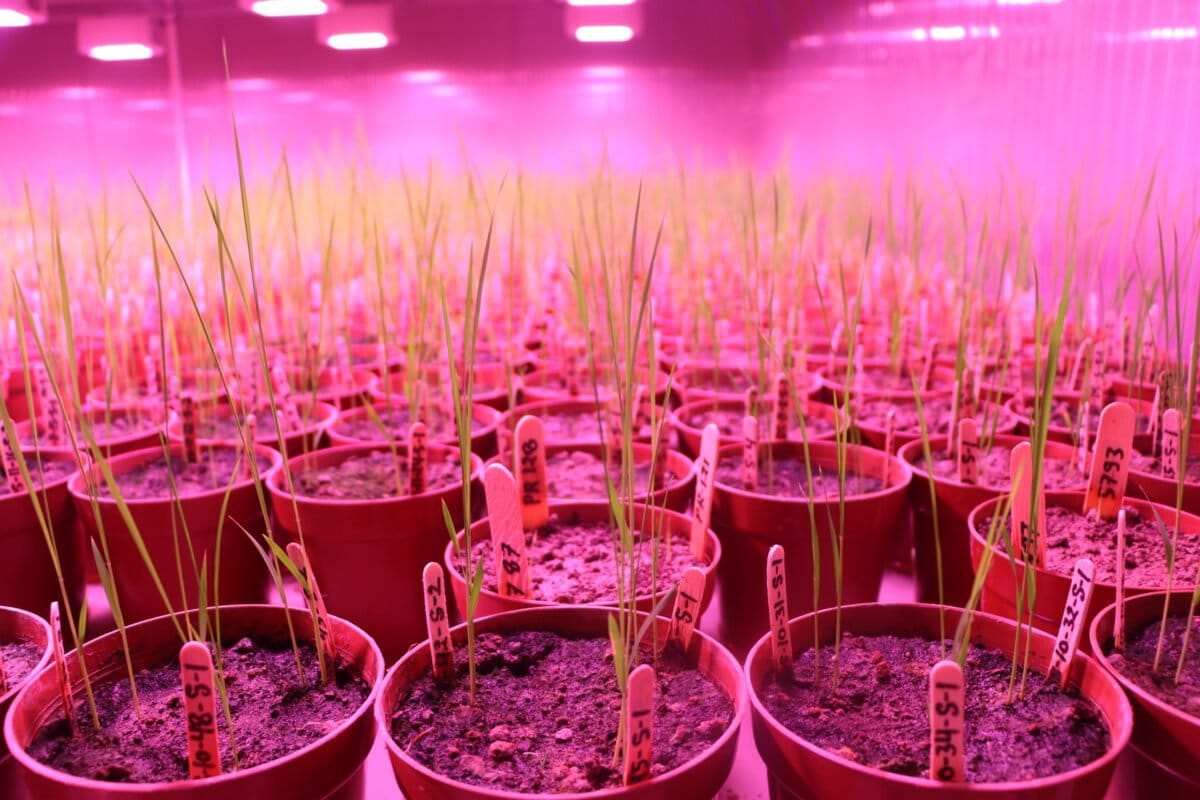- Corals are under constant threat by a number of anthropogenic and climatic factors.
- India has five different regions where coral reefs are found. All carry out coral transplantation projects in varied capacities.
- Experts say that while coral transplantation may help in increasing the genetic diversity and population numbers, it cannot be a singular solution to the threats that reefs are facing.
- An overhaul of fisheries management, reduction in emissions and an examination of developmental activities are the need of the hour instead, say experts.
Gliding through the water, a diver searches for small fragments of Turbinaria mesenterina or table coral, found in abundance near the islands of Goa in the Arabian Sea. Another diver brings a mesh bag. They then forage and find broken coral fragments and put them carefully in the bag. The bag is carried underwater to the transplantation location which is about half a kilometre away.
A metal frame table approximately six feet long and two feet wide, on which twelve tiles of 1×1 foot each are tied in two rows with a cable, is placed on the seabed and tied to the rocks close by for additional support. Using garden shears, they first cut the pieces of coral into smaller pieces of two to three cm each. Using Carboguard, a coral safe adhesive, they stick one fragment of coral at each of the four corners of every tile, making a total of 48 fragments of corals on each bed. It takes about 15-20 minutes for the adhesive to harden and stick.
“The micro fragments of coral grow much faster than bigger pieces of coral,” said Venkatesh Charloo, scuba diving instructor and founder trustee of Coastal Impact, a marine conservation non-profit based in Goa, that has just completed a project of coral transplantation in the state. “Table coral is a very hardy and resilient species of coral. It can withstand high temperatures and bleaching events, which have become almost an annual occurrence,” observed Charloo.
According to Charloo, there are patchy reefs present all along the coast of Goa. He has been diving for the last 25 years and has witnessed severe bleaching events in St. George, Grande Island and Pequeno islands in particular. A study conducted on the patchy reefs of Grande Island, along the eastern Arabian Sea during the 2015-16 bleaching event, where nearly 50 percent of the corals were affected, found that the severity was highest in Porites spp. corals and the least in foliose Turbinaria mesenterina.

“The hope is that the transplanted corals will increase the coral cover and therefore their chances of survival,” Charloo told Mongabay-India over a telephonic interview. Coral transplantation is a conservation method involving the relocation of a coral from a site with inhospitable conditions to a site where it has a higher chance of thriving.
Coral reefs in all waters of the world are under threat today, primarily due to anthropogenic factors. Localised threats include marine pollution, coral overmining, bottom trawling, blast fishing, infrastructural development activity along the shoreline, among others. The larger threat is the continuously rising sea surface temperatures, especially in the Indian Ocean, which according to the IPCC’s latest climate change report has warmed faster than the global average.
Other recent IPCC reports have cautioned that up to 90 percent of coral reefs could be lost by 2050, even if warming is limited to an increase of 1.5 degree Celsius. Coral reef restoration, a relatively novel approach, can be used as part of a broader management strategy to combat declines in coral health globally. It can also be used as a mechanism to help countries deliver on national and international commitments under various multilateral environmental agreements, says a recent UNEP-backed report on coral reef restoration. Coral reef restoration, which comes with challenges, is not designed to reduce climate impacts, but rather, it is intended as a complementary tool to support natural recovery following disturbance in high-value areas.

What is the deal with corals?
Corals are marine invertebrates of the phylum Cnidaria, a group that includes jellyfish, anemones and several other gelatinous and stinging creatures of the sea. They form compact colonies, and each individual coral is known as a polyp. Corals have a symbiotic relationship with microscopic algae called zooxanthellae that live in their tissues, acting as their primary food source and giving them their colour.
They are broadly of two types – soft and hard. Hard corals extract calcium carbonate from sea water to produce a hard exoskeleton structure around them. These structures form reefs. The coral reef systems are some of the most ancient, diverse and dynamic ecosystems of the world. Also called ‘rainforests of the sea’, they provide a home for at least 25 percent of the marine species. They are also known to protect the shoreline.
Coral reefs act as both carbon source and sink considering their ecological niche. They precipitate carbon dioxide to form calcium carbonate. However, this also results in the shift of pH at the local level and carbon dioxide is released back, notes Praveen Kumar, manager and head of marine project for coral transplantation at Wildlife Trust of India (WTI), Mithapur, Gujarat.
Warmer water temperatures can result in coral bleaching.

Many nations have environmental laws protecting coral reefs. In India, corals are given a Schedule 1 status under the Wildlife Protection Act. India has five main reef structures, the Gulf of Mannar in Tamil Nadu, Gulf of Kutch in Gujarat, Andaman and Nicobar Islands, the coast of Malvan, Sindhudurg in Maharashtra and parts of Goa, and Lakshadweep. Out of these, all except Lakshadweep have fringing reefs. Lakshadweep has an atoll reef, which is a ring-like structure surrounding the island.
Coral transplantation is carried out in all five reef regions in India, in varying capacities. While some have received ample support from the government, others have received funding from corporates and non-profits. The Gulf of Mannar in Tamil Nadu was the first state to experiment with coral transplantation in 2002.
The project, funded by the central Ministry of Environment, Forests and Climate Change, allowed scientists to carry out extensive research on working on possible measures to restore the degraded coral reefs. A mass bleaching event in 1998 had wiped out coral reefs across the Indian Ocean. “Corals can produce sexually as well as asexually. A broken piece of coral, as long as it is given a suitable substrate, can produce more over a period of time,” explained J.K. Patterson, director of Suganthi Devadason Marine Research Institute (SDMRI) based in Thoothukudi, Tamil Nadu.
Patterson has been working on corals in the Gulf of Mannar for over two decades. He explained that they do all their experiments in-situ or on the site itself. While they try to transplant the most resilient corals, they are mindful of ensuring genetic biodiversity. “We don’t want to do mono-restoration, so we transplant most species of corals in the degraded area itself,” he said. “We are interested in coral restoration of degraded areas, not catering to ornamental purposes,” he added.
While the Gulf of Mannar has been fortunate to receive steady funding for its work on corals, Patterson said that some more support is needed to understand the climate resilience of corals better.

Mithapur, in the Gulf of Kutch in Gujarat, is set to become the first location in the country for a coral garden. In 2015, non-profit Wildlife Trust of India partnered with Gujarat Forest Department in a project funded by Tata Chemical Limited to transplant pieces of boulder corals, which were found to be more resilient compared to those found on the natural reef. The Gulf of Kutch has been known for branching corals, a delicate but exquisite looking species of coral.
Experts say that heavy infrastructural development in the region could have caused heavy sedimentation in the waters, triggering the branching corals to perish. “Since 2015, we have been involved in transplanting boulder corals, a much more resilient variety of coral,” explained Praveen Kumar. “We also discovered that bleaching events did not disturb the boulder coral, showing that it is a much hardier variety,” he added.
Ever since the launch of the project, Kumar says that the restored reef areas have seen increased biodiversity along with better fish catch. “Since 2016-17, we have seen nine new species of fish coming to the reefs, five new species of seahorses, and the Indian humpback dolphin has returned to this area,” said Kumar. In addition, they have set-up a “no-take” zone for fishing, where fishers are not allowed to catch fish as the areas serve as nurseries and reservoirs of fish stock. He said it is a first of a kind initiative in India.
“We have done a little bit of restoration but if we have to put it in cumulative area, it might come up to 1000 sq.m. But giving this number would not be a correct representation. We’re working on a five square km area of reef. We can safely say that the entire reef has been restored only when it becomes stable and self-sufficient as in, it doesn’t require any external interventions. But that’ll not be before five years from now,” stressed Kumar.
He says that more research is needed to understand why the restored corals are showing a greater resilience than the natural corals, as they have not had funding to carry out research in a lab. “Not many studies have been done in Gulf of Kutch as far as bleaching is concerned. Gujarat forest dept will do biophysical monitoring of corals every year but they don’t collect bleaching data.”

In Goa, non-profit Coastal Impact won The Habitats Trust grant in 2020 that helped them kickstart a coral transplantation project in the state. “Coral reefs are found all over the coast of Goa, but we chose three islands for our project — St. George, Grande Island and Pequeno Island,” says Charloo, founder of the project, as the waters and conditions are better there. “I have been diving since 1995 in these waters. Due to low visibility, we can’t do much near the coastline due to the presence of pollution and faecal matter in the water,” he explained.
He added that the water temperatures can go up to 33 degrees Celsius in the months of April / May, causing the corals to bleach. “Usually, during the monsoon, the cold upwellings from the deep bring up cooler water along with nutrients to the surface and corals would go back to their original healthy state by the end of the monsoon. But this has not been the case in the last two-three years. The temperatures have stayed warm and the corals have remained bleached until mid-November,” he said.
This prompted him to start the transplantation project. He chose table coral because of its abundance and resilience. So far, they have transplanted 192 pieces of coral on four concrete beds. In order to continue the work of regular monitoring and maintenance of the coral beds and fresh transplantation work, they need more funds. “We have now opened up the corals for adoption,” says Charloo. Each coral fragment can be adopted for Rs 5,500 for a year. So far 47 corals have been adopted, he said.
In the Andamans, ReefWatch Marine Conservation, a non-profit, has been working on a restoration and rehabilitation project called Re(ef)Generate since late 2017. “This is one of India’s first reef restoration projects using mineral accretion technology,” said Roshni Yathiraj, former project manager at the outfit.
“What they do is collect naturally broken fragments of coral and transplant them onto metal structures that have mineral accretion devices providing a low voltage to increase growth rates of corals,” she explained. However, she adds that while transplantation is an effective method in maintaining genetic diversity and population numbers, it is still a “band-aid fix to the issue.” Environmental and anthropogenic stressors need to be addressed and solved for there to be an actual change in coral reef survival, she says.
 Marine animals and coral fragments on the dome structure built in the Andamans by ReefWatch Marine Conservation. Coral reef restoration, a relatively novel approach, is being used to combat declines in global coral health. Photo by Sumer Verma.
Marine animals and coral fragments on the dome structure built in the Andamans by ReefWatch Marine Conservation. Coral reef restoration, a relatively novel approach, is being used to combat declines in global coral health. Photo by Sumer Verma.
Coral transplantation ‘band aid fix’, need to address environmental stressors
While coral transplantation has been carried out in the ecologically fragile Lakshadweep archipelago, conservationists and researchers across the board feel that it cannot be seen as a one-stop solution. Lakshadweep has been in the news recently because a number of infrastructural development projects have been announced in the coral islands, and experts feel that it is a definite way to destroy them.
“Coral restoration efforts can be a great way to get communities involved in caring for their reefs, in sparking questions around reef ecology, and over time, maybe even in witnessing a patch of reef return to a healthier state,” said Shreya Yadav, marine biologist and PhD candidate at Hawai’i Institute of Marine Biology. “But it is absolutely not going to stop coral bleaching events, and save coral reefs from some of the biggest threats that face them today – careless development, overfishing, and pollution. The best thing we can do for reefs right now is reduce global emissions, work with fisher and coastal communities to develop sustainable and equitable fisheries, and really have an open discussion about who ‘development’ serves and whose future it has in mind.”

Naveen Namboothri, reef ecologist and director of Dakshin Foundation, a marine research and conservation non-profit based in Bengaluru, is sceptical about the efficacy of coral transplantation efforts as they are currently practised.
“You can’t really build a forest by just planting a few trees. Just like planting trees doesn’t build a forest, coral transplantation can’t really bring back a fully functional reef system. It is much more complicated than that. Reef restoration research needs more funding. It should not be equivalent to afforestation initiatives where it becomes one of those things where you tick off the box and say we will do our coral restoration to compensate for losses due to developmental activities. We need to get all ducks in a row before promoting coral transplantation as the alternative, let us spend more time on research to come up with demonstrable, viable solutions, and in the interim seriously look at fisheries management and minimising the impacts of other developmental pressures on coral reefs instead,” he said.
Banner image: ReefWatch Marine Conservation staff monitoring the growth of coral fragments on their artificial reef. Photo by Sumer Verma.














